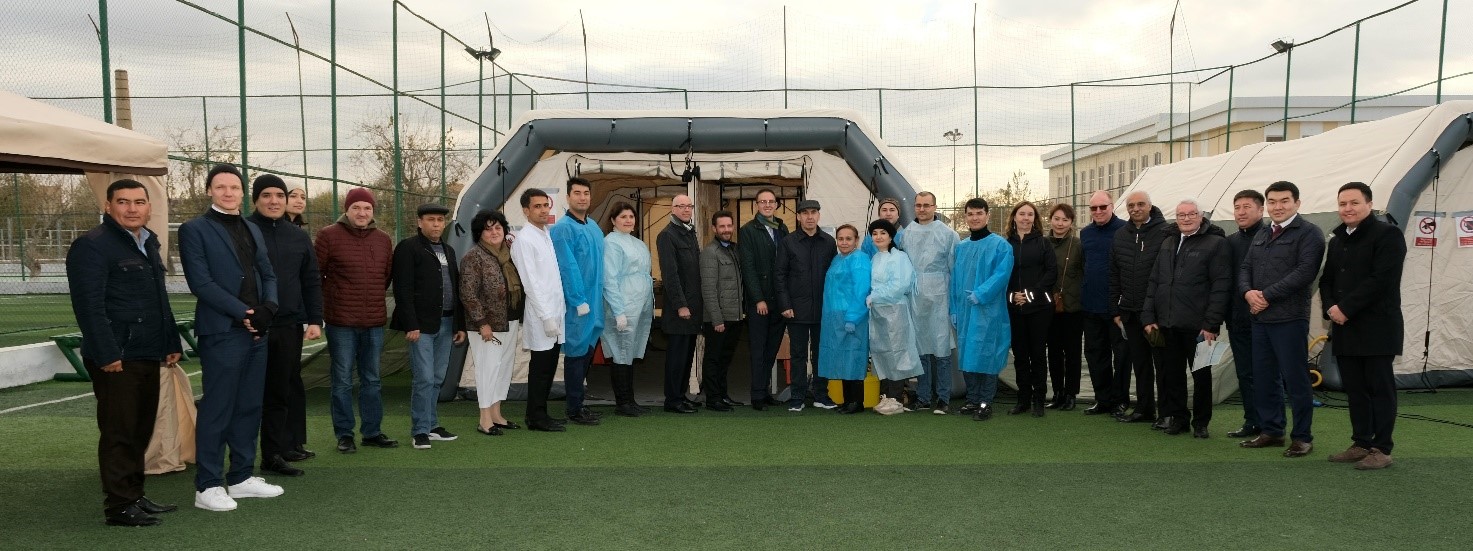PRESS RELEASE P53

Bukhara, 16 November 2022
PRESS RELEASE
Final field exercise for Uzbek experts to deploy mobile diagnostic laboratories as part of the EU cooperation efforts to fight the COVID19 pandemic and potential future outbreaks
Outbreaks of infectious diseases pose a substantial risk for public health, especially in remote rural areas where the disease surveillance infrastructures are often limited. In general, qualified laboratory specialists and diagnostic capabilities are mostly located in major urban centers. However, during local infectious disease outbreaks and pandemics it is critical that such resources are available in remote areas to support the population and prevent potential larger outbreaks; this has been true also in the case of the COVID-19 pandemic.
To support the Republic of Uzbekistan with such capacity needs, a field training exercise in the deployment of mobile laboratory units was carried out on 7-18 November 2022. This training was conducted within the framework of Project 53 of the European Union Chemical, Biological, Radiological and Nuclear Centres of Excellence (EU CBRN CoE) Initiative. Financed by the European Union, the project is implemented by the International Science and Technology Center (ISTC). The Field Training Exercise was held in Bukhara on 16th of November 2022, to simulate a deployment far away from the main laboratory resources, and to showcase the capacities of the response teams. The exercise was attended by National Focal Points of EU’s CBRN CoE Initiative from Kazakhstan, Kyrgyzstan, Pakistan, and Uzbekistan, as well as the diplomatic corps representing the EU and Germany.
In his opening remarks, Mr. Gulyamov, Head of the Regional Secretariat for Central Asia of EU’s CBRN Centre of Excellence Initiative, and Chairman of the Committee for Industrial Safety of the Republic of Uzbekistan said: “As the ongoing pandemic has shown, with infectious diseases, nobody is safe until everybody is safe. The mobile laboratories will enhance the Government’s ability to react to biological threats wherever they arise and to leave no one behind.”
“Provision of these two mobile laboratories is an example of the European Union’s long-term commitment to supporting resilience and prosperity in Central Asian, embedded into the Strategy of the European Union on Central Asia.” noted Mr. Wim Riepma, Head of Cooperation, Delegation of the European Union to the Republic of Uzbekistan.
Under Project 53, a series of trainings were provided by the Bundeswehr Institute of Microbiology (IMB) of Germany in using and deploying two diagnostic mobile laboratory units (conceptualised by IMB) that were handed over to the Ministry of Health of the Republic of Uzbekistan (in July 2021). These mobile laboratories are devised to allow the analysis of diagnostic samples against a variety of pathogens in remote and rural regions, where stationary laboratory capacities are not available. The laboratories were assigned to the Republican Specialized Scientific and Practical Medical Center for Epidemiology, Microbiology, Infectious and Parasitic Diseases (RSSPMCEMIPD); and to the Research Institute of Virology (RIV). The equipment will be deployed to detect and respond to the outbreaks of highly infectious diseases.
Background information:
The EU CBRN CoE Initiative is funded by the European Commission and implemented in cooperation with the United Nations Interregional Crime and Justice Research Institute (UNICRI) and the European Commission Joint Research Centre (JRC). The European External Action Service is also involved in the follow-up to the initiative. The initiative is developed with the technical support of relevant international and regional organizations, the EU Member States, and other stakeholders, through coherent and effective cooperation at the national, regional and international level. The initiative involves 64 countries in eight regions across the world.
The International Science and Technology Center, implementer of Project 53, has managed several hundred projects in Central Asia over the past 25 years. More information about ISTC is available at: www.istc.int

